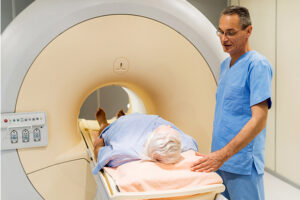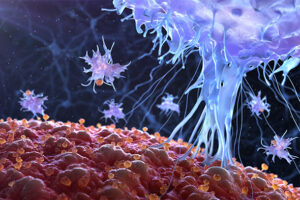Oncology
Prostate Cancer
Advanced Prostate Cancer: Management of Sexual Dysfunction
Overview
Included among the challenges faced by patients with advanced prostate cancer after receiving hormonal therapy, radiation, or surgery is sexual dysfunction. Adequate counseling about the potential for side effects with any therapy is viewed as crucial in helping men to accept their treatment, with less of a negative impact on their lifestyles.
Expert Commentary
Leonard Gomella, MD
|
|
“We are fortunate to have many excellent advanced practice providers who can counsel patients on what to expect with each treatment, and I think that such counseling is crucial.”
Sexual dysfunction and urinary incontinence are some of the challenges that men with prostate cancer may experience at various points in the course of their disease and its management. As one may expect, these issues can have a negative impact on a patient’s quality of life.
When used in the proper context, androgen deprivation therapy (ADT) improves outcomes in individuals with prostate cancer, and that is unequivocal. I find that patients who are adequately counselled about the potential for side effects with ADT accept treatment with more understanding, and there is less of a negative impact on their lifestyles. We are fortunate to have many excellent advanced practice providers who can counsel patients on what to expect with each treatment, and I think that such counseling is crucial. In older men with advanced prostate cancer, it is important to recognize that there is a natural decline in testosterone levels over age 40 years, and, although treatment with ADT may accelerate that decline, an older man may not notice those effects as much as a younger man. In those with advanced prostate cancer, the next-generation androgen receptor–targeted therapies are typically used for individuals who are already on ADT, who already have a suppressed testosterone, and who are familiar with those side effects. When you are adding to ADT, you are not necessarily affecting their central nervous system response to testosterone as much.
Both surgery and radiation therapy for prostate cancer are associated with the risk of erectile dysfunction. There is ongoing debate about the effects of surgery vs radiation on erectile function and about which approach may be preferable. I can find multiple studies to support either side of the debate. My sense is that, after a few years, erectile function is generally similar between both approaches. The key is for patients to understand that maintaining the same level of potency is not a guarantee with either approach.
There may be a delayed recovery in erectile function following radical prostatectomy, whereas men who were able to maintain erectile function immediately after radiation may experience some decline over time. In addition, nerve-sparing robotic-assisted radical prostatectomy has allowed men to regain their erectile function, with or without the use of erectile dysfunction medications. Although urinary incontinence is more frequently reported after surgery than after radiation, with advances in robotic-assisted radical prostatectomy, there is less damage to the external urinary sphincter and incontinence is not as common as it was in the past.
References
Downing A, Wright P, Hounsome L, et al. Quality of life in men living with advanced and localised prostate cancer in the UK: a population-based study. Lancet Oncol. 2019;20:436-447.
Hoffman KE, Penson DF, Zhao Z, et al. Patient-reported outcomes through 5 years for active surveillance, surgery, brachytherapy, or external beam radiation with or without androgen deprivation therapy for localized prostate cancer. JAMA. 2020;323(2):149-163.
Lee J, Kim HY, Goh HJ. Retzius sparing robot-assisted radical prostatectomy conveys early regain of continence over conventional robot-assisted radical prostatectomy: a propensity score matched analysis of 1,863 patients. J Urol. 2020;203(1):137-144.
Steentjes L, Siesling S, Drummond FJ, van Manen JG, Sharp L, Gavin A. Factors associated with current and severe physical side-effects after prostate cancer treatment: what men report. Eur J Cancer Care (Engl). 2018;27(1). doi: 10.1111/ecc.12589. Epub 2016 Oct 10.











